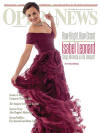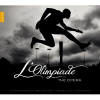Texte paru dans: / Appeared in:
*

Opera News:
Pour
s'abonner / Subscription information
Naïve
V5295

0822186052952
Consultez toutes les évaluations recensées pour ce cd
~~~~ Reach all the evaluations located for this CD
The opera seria librettist Pietro Metastasio was prized for his noble style, clear plotlines (though they often involved contrived misunderstandings) and direct, passionate language well suited to musical setting. His texts were used multiple times, as audiences apparently liked the characters and enjoyed each new composer’s take on a familiar story. L’Olimpiade was put to music more than fifty times, first by Caldara, in 1733, then by Vivaldi, Hasse, Pergolesi, Cimarosa and Paisiello in 1786. Even Donizetti gave it a shot in 1817.
The Venice Baroque Orchestra first produced Cimarosa’s 1784 version, later on performed Galuppi’s 1748 setting and finally hit upon the idea of a pasticcio representing sixteen composers and including all of Metastasio’s original arias. Although an eighteenth-century pasticcio would have had newly-fashioned recitative (which is where all the action is), the Venice Baroque Orchestra, under guest conductor Markellos Chryssicos, opts for none, filling two discs with twenty arias, one duet, an opening sinfonia and a handful of short choruses for what is essentially a gala party event.
Set against the background of the ancient Olympic Games, the former champion Megacles competes under the name of his friend Lycidas, entangling them both with the princesses Aristaea and Argene, who is in disguise as a shepherdess. Conflicts of love and duty lead to attempted suicide, a near regicide and a last-minute discovery that Lycidas is the king’s long-lost son, who nearly married his own sister.
Mezzo-soprano Romina Basso is a commanding Megacle, extravagantly ornamenting her opening aria “Superbo di me stessa” in Hasse’s setting and bringing musical vigor to every selection. Franziska Gottwald’s voice lies too high for much of her music, and though her soft-edged mezzo-soprano sound is attractive, she is often buried in the orchestral fabric. Gottwald gets Vivaldi’s gorgeous, often-recorded “Mentre dormi” and sustains the placid atmosphere admirably.
As the generous-hearted Argene, soprano Karina Gauvin brings arresting style to Sarti’s limpid setting of “Oh care selve” and to Davide Perez’s “Più non si trovano.” Gauvin’s dark-hued voice colors Traetta’s “Che non mi disse un dì!”, but here and in Perez’s “Fiamma ignota” she loses vocal color and presence in fioritura passages and often lunges at high notes. Soprano Ruth Rosique brings bright tone to the role of Aristea, and she gets the attractive and perky “Grandi, è ver” (Caldara), but top notes are often spread, and she lacks vocal stature for Leo’s rage aria, “Tu me da me dividi.”
As King Clistene, tenor Nicholas Phan tosses off Josef Myslivecek’s “Del destin non vi lagnate” (it’s easy to see why Mozart admired this Czech composer) and brings a welcome freshness to each aria, especially Cimarosa’s eloquent setting of “Non sò donde viene,” familiar from Mozart’s concert-aria settings. Firm-voiced countertenor Nicholas Spanos takes on the role of the tutor Aminta, singing two superb arias from Hasse’s Olimpiade. Both use conventional imagery of the hapless ship tossed about by the waves of Fate, with imaginative bassoon writing in “Siam navi allonde algenti” depicting the stormy seas.
In the spirit of the Olympic Games, I award the gold medal to Johann Adolf Hasse.
Cliquez l'un ou l'autre
bouton pour découvrir bien d'autres critiques de CD
Click either button for many other reviews


